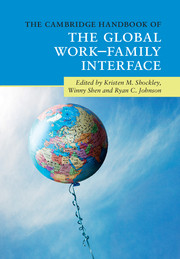Book contents
- The Cambridge Handbook of the Global Work–Family Interface
- The Cambridge Handbook of the Global Work–Family Interface
- Copyright page
- Contents
- Figures
- Tables
- Contributors
- Part I Overview
- Part II Assessing Cultural and Structural Differences
- Part III Methodological Considerations
- Part IV Review of Research in Regions across the Globe
- Part V Cultures within Cultures
- 22 A Cultures within Culture Perspective on Work and Family among United States Employees
- 23 Cultures within Cultures in Israel: Jewish and Arab Cultures and the Work–Family Interface
- 24 Modernity Meets Tradition: Managing the Work–Family Interface in South Africa
- 25 Work and Family among Immigrants
- 26 Expatriation and the Work–Family Interface
- Part VI Organizational Perspectives
- Part VII Family Perspectives
- Part VIII Individual Perspectives
- Part IX Conclusion
- Index
- References
23 - Cultures within Cultures in Israel: Jewish and Arab Cultures and the Work–Family Interface
from Part V - Cultures within Cultures
Published online by Cambridge University Press: 16 April 2018
- The Cambridge Handbook of the Global Work–Family Interface
- The Cambridge Handbook of the Global Work–Family Interface
- Copyright page
- Contents
- Figures
- Tables
- Contributors
- Part I Overview
- Part II Assessing Cultural and Structural Differences
- Part III Methodological Considerations
- Part IV Review of Research in Regions across the Globe
- Part V Cultures within Cultures
- 22 A Cultures within Culture Perspective on Work and Family among United States Employees
- 23 Cultures within Cultures in Israel: Jewish and Arab Cultures and the Work–Family Interface
- 24 Modernity Meets Tradition: Managing the Work–Family Interface in South Africa
- 25 Work and Family among Immigrants
- 26 Expatriation and the Work–Family Interface
- Part VI Organizational Perspectives
- Part VII Family Perspectives
- Part VIII Individual Perspectives
- Part IX Conclusion
- Index
- References
Summary
- Type
- Chapter
- Information
- The Cambridge Handbook of the Global Work–Family Interface , pp. 424 - 435Publisher: Cambridge University PressPrint publication year: 2018
References
- 4
- Cited by



